- Home
- Richard Adams
The Day Gone By Page 32
The Day Gone By Read online
Page 32
Late in the spring of 1941, ‘G’ section had a welcome bit of luck to break the monotony of camp life. You have to understand that we were all fretting - pining - for real work. We wanted our lorries and ourselves to be used in earnest, not merely maintained and ’ighly polished day after day. In the sort of conditions we were, the true distinction was not between work and play, but between meaningful activity and boring inactivity. Any Lakeland sheepdog feels the same: they obviously like being put to use and are eager for work. What ‘G’ section got was the so-called Seskinore detachment.
Early in 1941, it was determined by the High Command that a fresh division should be moved into Ulster, its various units to be stationed throughout the Counties Omagh and Fermanagh. The quartermastering part of this was, of course, a big job and its details were to be arranged and controlled by a captain quartermaster from his own H.Q. in the barracks at Omagh. Naturally, he needed a fleet of lorries, and so informed C.R.A.S.C. at Lisburn. What he got sent to him was ‘G’ section. As far as I remember, we got about two hours’ notice to get packed up and ready to drive the seventy or eighty miles from Langford Lodge to Omagh. It was, of course, a matter for jubilation to be selected to go. I wonder, now, that our O.C. didn’t send Frank Espley. He would have been out and away the best subaltern, but perhaps my section had slightly the better N.C.O.s and blokes.
Seskinore is a village about six or seven miles south-south-east of Omagh, in the County Tyrone. Here there was a small R.A.S.C. supply unit (not motorized), commanded by one Captain Slater, to whom I duly reported ‘G’ section that evening. Details fail me in memory, but I do recall that the way things eventually turned out was that I messed at Seskinore, while ‘G’ section were billeted in a bunk-bedded parish hall in Omagh. They thought the whole setup was a riot; the best thing that had happened for months. So did I.
Three-spired Omagh was a pretty place at that time; a remote little county town almost at the end of the world, with King Billy prominent in every home (you can take a white horse anywhere) and the pubs, full of porter. The natives were more than friendly, the soda bread was excellent and ‘G’ section were declared to be great fellas, surely.
The quartermaster was a nice old regular called Captain Milner. I liked him, and he and Sergeant Tuckey took to each other at once. Every morning, with notebooks at the ready, Sergeant Tuckey and I would report to Captain Milner, to learn what he wanted done. The deliveries consisted of chairs, tables, bunk-beds, cupboards, lockers, mattresses, mats and all the rest of it, to be loaded at X and driven to Y the same day. For labour we had a detachment of the Pioneer Corps; and it was in this area that I had a little squabble with my section. ‘G’ section drivers didn’t reckon to join in loading and unloading: they reckoned to sit and smoke in the cab while the Pioneers (mostly foreign refugees) got on with it. I disputed this and finally, faced with muttering by the N.C.O.s, rolled up my sleeves and did some fair spells of loading myself. I can guess what happened when my back was turned, but as long as it wasn’t, the drivers helped to load.
This was the first time in my life that I had had to organize anything on my own, and it wasn’t altogether as easy as it may sound. The miscellaneous loads had to be worked out and the necessary number of trips and lorries. All you could go by was empiricism: there were no loading tables, and anyway the items were very various. Some of them were fragile, too. The destinations were all over the place; anywhere at all in the Counties Tyrone and Fermanagh: Ballygawley and Newtownstewart; Fintona, Castle-derg and Lisnaskea; Dromore, Strabane and Aughnacloy; Augher and Clogher and Fivemiletown. There weren’t enough N.C.O.s to escort each individual run, which might involve anything from six or seven lorries down to a single one. Private soldiers (drivers) weren’t supposed to be able to read maps and so couldn’t be held responsible if they got them wrong. Sergeant Tuckey and I would work out the most economical route by which a corporal on a motor-bike could conduct four, five or six lorries to different destinations, dropping one off here and two off there. Then the drivers and pioneers had to be fed, by arrangement. We had to do our best to calculate the duration of the various jobs, so that Driver Limbrick or Driver Seabourne could be reckoned to be able to get back from job A with enough time left in the day to get reloaded and do job B. Inevitably, there was a fair amount of what von Clausewitz calls ‘friction’; the many little hitches that interfere with the smooth working of the machine. Driver Petherick arrives at his destination to find he is seriously expected to reverse his lorry up three hundred yards of impossibly muddy boreen. He doesn’t fancy a dose of wheelspin: he refuses. The pioneers refuse, not unreasonably, to hump the load. Something has to be sorted out. Driver Harris has blown a gasket near some God-forsaken place called Drumquin. Captain Milner isn’t quite right about the relative proximity of X to Y, and must be tactfully told, with, if possible, a constructive suggestion about what’s best to be done. Driver Portway has hit a dog/pig/donkey/goat, and the owner, be Jasus, is declaring it has him fair destroyed and where’s the lieutenant at all?
As the days went by, the light lasted longer and the weather improved, Sergeant Tuckey and I found that we carried in our heads cognitive maps of Tyrone and Fermanagh, including the better pubs. Captain Milner was pleased with the work and said so. I had become reasonably proficient on a motor-bike, and would sometimes take a convoy myself or else ride round to half a dozen destinations to make sure my drivers were not being messed about by some twit of a stranger N.C.O. I began to feel that I really knew ‘G’ section and was capable of using them to the best advantage as a technical tool. As for ‘G’ section, they hoped it would never end. They were a good lot: I was still too inexperienced to realize what a good lot they were. Throughout the Seskinore detachment, not one man was put on a charge and only one man collected a minor punishment.
Driver Mallett it was, of all people: biddable, reliable, polite, intelligent, pleasant-spoken, impeded from a stripe only by a certain diffidence in his ways and manner. One morning, on parade, as I and Sergeant Tuckey were walking up the back of the front rank, Tuckey remarked, on his own initiative, ‘You want ’aircut, Mallett.’ ‘Sergeant.’ That day, however, turned out an unusually busy one, with several of our lorries out late, and Mallett didn’t get back from Coalisland until after supper-time. The following morning found him in the same crinite condition. ‘’Aircut, Mallett,’ said Tuckey. ‘’Shan’t tell y’again.’
But once more the exigencies of the service kept poor Mallett out until a late hour. This time it was a broken-down motor-cycle to be taken back for repair to headquarters workshops at Langford Lodge. (We had a workshops fitter with us on the detachment, a good fellow named Kliskey, but of course there were limits to what he could effect on his own.) In Mallett’s position, I’d have got a mate to get to work with nail-scissors and a safety razor, but anyway he didn’t. Next morning on parade I saw what hadn’t happened, but decided to leave it to the sergeant, as he’d shot first. I moved on up the rank as Tuckey, in a low, confidential voice, began ‘Now you listen to me, Lady Godiva -’
But all Mallett got was cleaning the N.C.O.s’ motor-bikes. One evening, when I had left my little Austin staff-car parked outside the billets while I held an N.C.O.s’ meeting, I came out to find that Turner and Beach - two big, strong men - for a joke had lifted it, fore and aft, onto the pavement. I took this as a signal compliment. My relations with the section were now such that I was considered fair game for a harmless practical joke.
It was during this spring that something much less funny for me took place. I had been writing to Jennifer regularly and at great length, while the weeks extended into months. I wish I had those letters now, for there would be a lot of forgotten stuff in them: like the time of heavy snow when we shovelled the railway line clear at Crumlin; and the hot summer day when I swam from Langford Lodge out to Ram’s Island, in Lough Neagh, about a mile, with Frank accompanying me in a dinghy. Jennifer, however, had seldom or never replied to these letters. I wasn’t really
surprised or troubled in mind, for one thing because I knew she was only about three-quarters literate and for another because I knew her to be lazy and inconsequent. I had no reason to suppose she wasn’t glad to get my letters or that she didn’t enjoy reading them as much as I enjoyed writing them. I was already looking forward to my first spell of leave.
The letter which at length came from Jennifer wasn’t very long - probably shorter than this synthesis of it. It told how, a few weeks after Frank and I had left for Ulster, she had met an R.A.F. Pilot Officer trainee - a flying cadet, in fact. He had found her no less charming than I had. She had fallen entirely and all-absorbingly in love with him. They had become lovers and were to get married. She had just heard that he had been killed in training: she didn’t say how. She couldn’t bring herself to write more. She was very sorry. Her mother would write and tell me more.
I don’t think many people can have been confronted with a situation like this. Some girls, of course, would have written a ‘Dear John’ letter as soon as they were sure of their own mind. In that event I would have known what Jennifer had felt (and done) weeks before her lover died. But that wouldn’t have been like Jennifer. She always used to let life slide. This was like - no, not like: it was - being introduced to an unknown man who, although dead, still had the power to cut you out. Of course I felt sorry for him and very sorry for Jennifer. But equally, of course, my sorrow was qualified; by knowing that Jennifer had been this chap’s lover as she had not been mine; by the fact that he was dead; and by not being able to help feeling that I ought to have been told something sooner. (True, there had been no actual obligation on Jennifer to have told me anything at all, but a responsible girl would have done so.) What ought I to do, I wondered. There wasn’t much to be done, except to reply to her letter with appropriate sympathy and hope that perhaps one day we might meet again as friends, etc. I did that, but of course it expressed little or nothing of what I really felt. I felt forsaken; or could it be, discarded? From my point of view, it didn’t really make much difference that the poor chap was dead. Dead or alive, the fact remained that obviously Jennifer couldn’t get back to feeling about me as she had formerly. She wouldn’t be around again for a long time, if ever. The only sensible thing to do was to forget her by a deliberate act of will. (Her mother did write; a sweet letter, full of understanding, but of course it made no difference.)
In Captain Milner’s office at Omagh there was an extremely pretty A.T.S. girl, who typed and answered the ‘phone. Her name was Kaye McNulty and her home was in Belfast. She was delighted to be asked out to dinner by a real lieutenant.
For me, our relationship was the equivalent of the ‘good long holiday abroad’. I wanted to be taken out of myself, and was ready enough to let Kaye and the relationship take us whither it would. It took us to bed, which was nice. Also, as every young man knows, it is gratifying to be seen around in public with a conspicuously pretty companion. Kaye was an Ulster girl, and this helped things along no bounds, since she knew the country well and enjoyed showing it to me. It created what I needed - a new world.
The Seskinore detachment, like all good things, came to an end and ‘G’ section had to return to Langford Lodge. However, my relationship with Kaye was by no means fatally affected. She seemed to get week-ends off very much as though her job had been on a peace-time footing, and often it wasn’t very difficult for me to get a twenty-four-hour pass. I couldn’t, of course, keep things secret from my friends in the mess. One Saturday, when Kaye and I were having a drink in the lounge bar of one of the hotels in Belfast, some of my fellow subalterns happened to drop in. They left me in no doubt of their admiration for Kaye. Theo Overman, who used to devise topical lampoons to be sung in the mess when the beer was flowing, added another stanza to his version of ‘There ain’t no flies on Auntie’.
Verse: ‘Oh, there ain’t no flies on Dicky,
On Dicky, on Dicky.
There ain’t no flies on Dicky
And I will tell you why.
To Seskinore the ‘G’ men went
But with the A.T.S. his time was spent.
Oh, there ain’t no flies on Dicky
And that’s the reason why.’
Chorus: ‘Oh, there ain’t no flies on Dicky, on Dicky,
There ain’t no flies on Dicky
And I will tell you why.
He turned the key and locked the door.
The room was number five-oh-four,
So there ain’t no flies on Dicky
And that’s the reason why.’
Kaye took me to Enniskillen, and we walked by the solitude of Lough Erne in a long, calm evening, the great, empty expanse of water still as any pool, while a red sun smouldered and failed out of the sky. Kaye said she felt that if I threw in a sword, a hand would appear from the water and catch it by the hilt. Another time we went to Londonderry, walked round the walls and stood where Governor Walker had stood in July 1689, when King Billy’s relieving ships broke the boom.
We went to Newry; and to Newcastle under the Mountains of Mourne, and climbed Slieve Donard in the rain. Once, having got a three-day pass, I took Kaye, wearing a mendacious wedding-ring, into the republic. We stayed at Collooney in the County Sligo, and walked out to Lough Arrow.
Before the end of 1941, however, I had become inwardly impatient with this static soldiering, which seemed to hold out no prospect of anything more active or exciting. A reorganization of the R.A.S.C. had resulted, inter alia, in the abolition of so large and bulky a unit as the ‘Corps Troops Petrol Park’, which had really been better suited to World War I than to World War II organization. It was split up, and in the process, to my grief, I lost command of ‘G’ section and became an officer in a smaller unit, the 3rd Corps Troops Petrol Company, stationed on the Maze race course. Frank Espley was not one of those who came with us, and inevitably he and I lost touch with each other. Sergeant Tuckey was still with me, and the two of us were given command of a completely ‘green’ section, straight out of recruits’ training depot. They weren’t a bad lot, and after a few weeks we began to feel reasonably proud of them, and they of themselves. The trouble lay elsewhere; in the person of the commanding officer. I had better give him a pseudonym.
Major Trill was a regular officer, and very young indeed to be a major. He was not yet twenty-four. He was a tall, fair young man, intensely assiduous and lacking in any sense of humour. It was a small mess — not more than nine officers in all — and there wasn’t much opportunity to keep clear of him. We had several tiffs, for he was inclined to be thin-skinned, conscious of his age, and also, as a regular, reckoned to larn us a thing or two before he was done. With nearly a year’s experience of commanding a platoon on active service, I did not take kindly to this. There were other reasons, too, for feeling that Ulster had become a back-water for an officer who had gained some experience. The war in the Western Desert had begun in earnest. Wavell had defeated the Italians in his campaign of 1941, and only the fulfilment of the British obligation to divert troops to fight against the Germans in Greece had prevented him from forging on into Tripolitania. Greece had fallen to Hitler and then the German airborne troops, at enormous cost in casualties, had invaded and taken Crete, coming within half a plank of defeat in the process. By December 1941 Operation Barbarossa, the Wehrmacht’s attack on Russia, which had begun in June 1941, had brought the Germans to the very outskirts of Moscow. During the same month the Japanese made their attack on Pearl Harbour and America entered the war. The first months of 1942 saw the high-water mark of the Axis, while at the same time, in February, Singapore fell to the Japanese. I am bound to admit that I personally was fully expecting Russia to be defeated, after which, no doubt, Germany would find itself ready at last to invade England. I had changed my original state of mind of being determined to avoid the infantry. I now reckoned that it was up to everyone, in the desperate straits we were in, to be ready to do something active. If you were going to be killed anyway, you might as well be killed fightin
g the enemy. At least it would be preferable, or so I thought, to continuing to kick around the Maze race course under the dubious command of Major Trill.
How was one, however, to get transferred to a more active role? It wasn’t so easy. As an officer of a specialized arm (e.g., Signals, Engineers, Ordnance, R.A.S.C, Gunners, etc.) one could not simply leave that arm and transfer to another. To do so (it was reckoned) would be a waste of all the training (and experience) that had been lavished on you by the army.
While I was pondering the problem, I got a spell of leave and spent some two weeks at home; and it was here, round and about Newbury, that I first clapped my eyes on the newly-formed Airborne Forces. I was by no means of a sceptical temperament in those days: indeed, I was romantic and impressionable to a degree, and the sight of the red beret and the flamboyant blue and maroon pegasus flash excited me and went straight to my heart. This was the answer! I would volunteer for Airborne Forces! There were Airborne R.A.S.C. as there were Airborne Gunners, Sappers and Signals. I would transfer in my capacity as an R.A.S.C. officer.

 Watership Down
Watership Down Tales From Watership Down
Tales From Watership Down Maia
Maia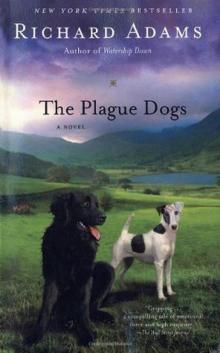 The Plague Dogs
The Plague Dogs Shardik
Shardik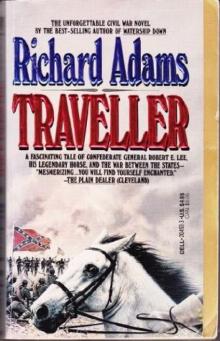 Traveller
Traveller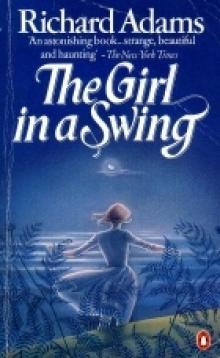 The Girl in a Swing
The Girl in a Swing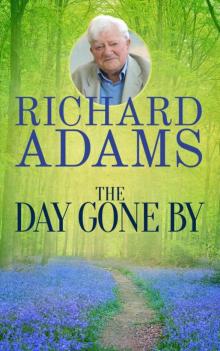 The Day Gone By
The Day Gone By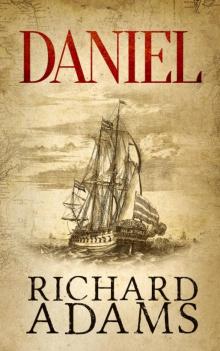 Daniel
Daniel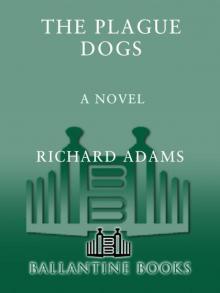 The Plague Dogs: A Novel
The Plague Dogs: A Novel